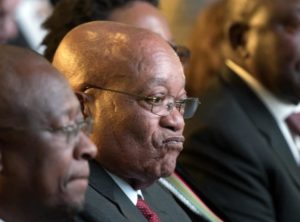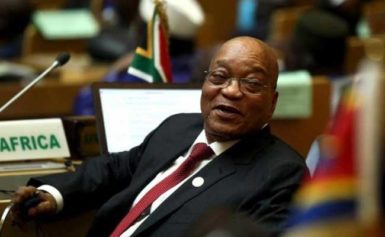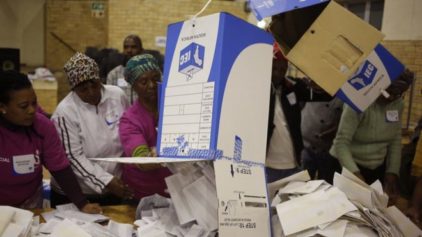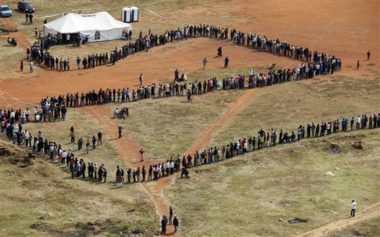
FILE — In this Saturday, Aug. 6, 2016 file photo, South African President Jacob Zuma, attends the declaration announcement of the municipal elections in Pretoria, South Africa. As the African National Congress meets this weekend to choose a successor to scandal-ridden Zuma, the race between his deputy and ex-wife threatens to split Nelson Mandela’s legacy. (AP Photo/Herman Verwey, File)
JOHANNESBURG (AP) — The stakes for Africa’s oldest liberation movement have rarely been higher. As thousands of delegates from the ruling African National Congress party meet this weekend to choose a successor to scandal-ridden President Jacob Zuma, the race between his deputy and ex-wife threatens to split Nelson Mandela’s legacy.
Zuma is finishing his second and final term as ANC leader, and whoever follows him will likely be elected South Africa’s next president in 2019. Though weakened by multiple corruption allegations against the president, the ANC has led the country since the end of white minority rule in 1994.
Of the seven candidates in the race to succeed Zuma, the two front-runners lead increasingly entrenched party factions: Deputy President Cyril Ramaphosa, 65, and former African Union Commission chair Nkosazana Dlamini-Zuma, 68, who is also Zuma’s ex-wife.
Ramaphosa, who helped negotiate an end to apartheid, has become one of the wealthiest men in a democratic South Africa. He presents himself as the reform candidate, pledging to bring an end to graft and revive the flagging economy.
Dlamini-Zuma, a doctor and former government minister, was recently appointed to a parliamentary seat. She has pledged to pursue her ex-husband’s favored policy of “radical economic transformation” to bring greater equity to an economy still largely controlled by South Africa’s white minority.
“Whites talk too much against (radical economic transformation), saying that we want to use it to loot,” Dlamini-Zuma said during a visit on Sunday to her rural hometown, according to The Star newspaper. “Who are they to talk about looting? They have been stealing ever since their arrival in this country.”
The choice of Ramaphosa or Dlamini-Zuma as the new ANC leader could determine whether Zuma finishes his term as South Africa’s president or steps down early to allow the new party leader to campaign out of his shadow. Some suggest that either candidate could tell Zuma to resign as head of state, which head of the ruling party has the power to do. “There’s a shared consensus that he is a liability,” said Mcebisi Ndletyana, a professor of politics at the University of Johannesburg.
Whoever prevails during the five-day conference, which begins Saturday, faces a daunting task. The ANC, which marked its 105th anniversary this year, fought to end apartheid and has dominated the political landscape since then. But it has been paralyzed by internal fighting and is losing support among voters who are frustrated that it has failed to deliver on the promise of a post-apartheid government.
More than 55 percent of South Africans now live below the poverty line, Zuma said Thursday. Unemployment hovers close to 28 percent, disproportionately affecting the black majority. Many living in major cities don’t have access to regular electricity and water, and the public health and education systems are ailing. An international study released last week found that nearly 80 percent of South African students in Grade 4 couldn’t read at an appropriate level.
Zuma’s popularity has plummeted, his reputation damaged by the corruption allegations. Last year, the president was forced to repay millions in taxpayer money spent on upgrades to his sprawling personal estate, and he has fought an attempt to reinstate multiple corruption charges against him.
“State capture” – the attempt to control state resources for private gain – has become a byword for frustration with Zuma and his allies. Emails leaked to South African media this year detailed how one wealthy family, the Guptas, attempted to use their proximity to the president to influence political appointments and secure business contracts.
Both Zuma and the Guptas have denied wrongdoing, but voters have registered their dissatisfaction. In municipal elections last year, the ANC’s vote share fell below 60 percent for the first time, and the party lost control of key cities including Johannesburg and the capital, Pretoria.
Many inside and outside the party say the downward trajectory of the ANC, and the country will continue under a party led by Dlamini-Zuma, whose critics say she may seek to shelter her former husband from corruption charges and doesn’t have a convincing plan for economic recovery.
“For the ANC, it’s a choice between whether the party wants to collapse or begin a renewal. For South Africa, it’s stagnation versus growth,” said William Gumede, executive chairman of the Johannesburg-based Democracy Works Foundation think tank.
Though early tallies from ANC branches around the country showed Ramaphosa in the lead, observers warned it was too early to call a clear front-runner. In the case of a deadlock, Treasurer General Zweli Mkhize has been considered a potential compromise candidate.
ANC leaders, including Ramaphosa, have warned against trying to sway delegates with cash, cars or promises of jobs or contracts.
“In a race that is potentially very, very close, even five or 10 votes could add up,” said Susan Booysen, a politics professor at the University of Witwatersrand in Johannesburg.
Despite party leaders’ calls for unity, divisions run so deep that either outcome could mean the end of the ANC’s dominance. Members of the losing faction could form a new party, analysts say, taking enough votes with them in 2019 to force the ANC into a coalition for the first time.
Critics of Zuma and his allies say the party may not survive without a major leadership shakeup.
“This is it,” Gumede said. “If the reformers don’t get control of the ANC now, it is potentially the end of the party.”


